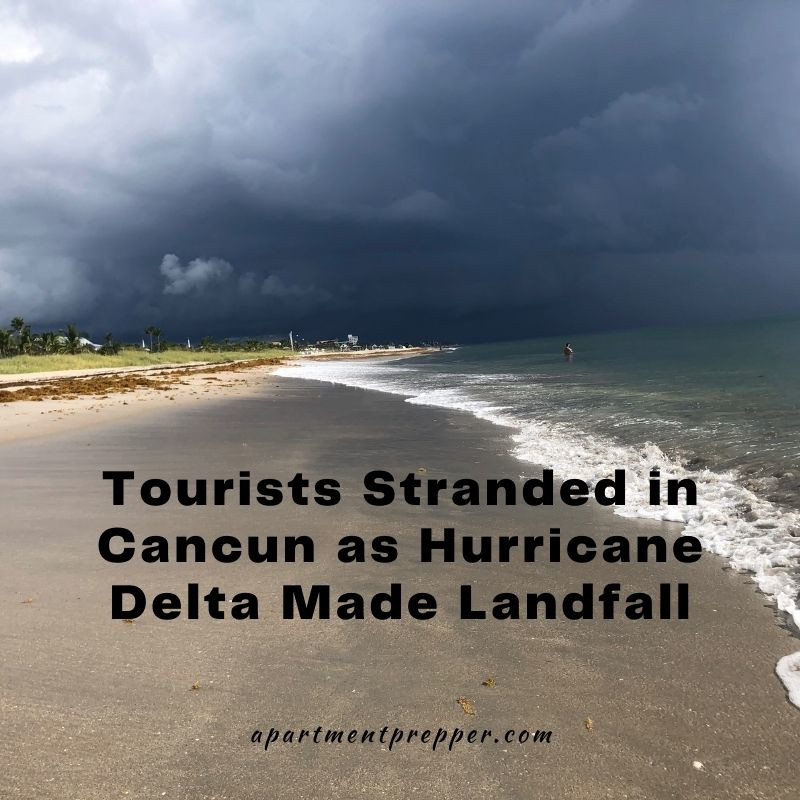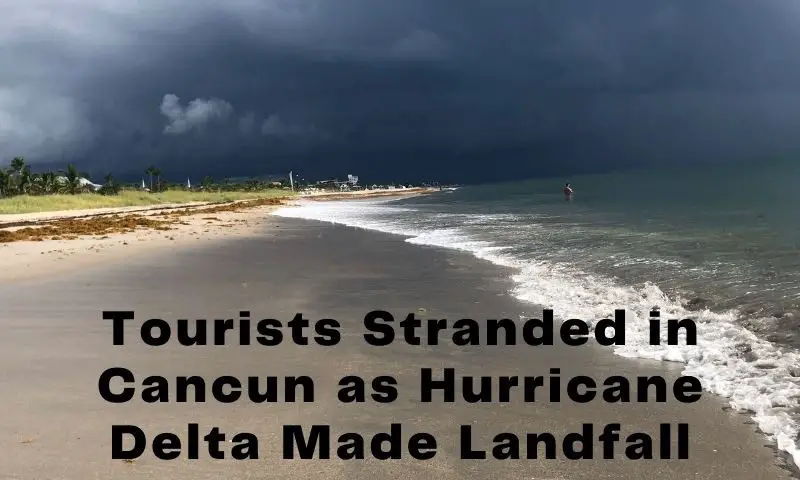Written by Bernie Carr
Hundreds of American tourists had to evacuate their hotels in Cancun this week as they braced for Hurricane Delta.
According to The Daily Mail:
Delta made landfall at about 5.30am as an extremely dangerous category 2 hurricane with winds of up to 110mph downing nearly 100 trees and knocking out power along the northeastern coast of the Yucatan Peninsula.
The Hotel Association of Cancun said more than 40,000 tourists were evacuated from resorts in and around Cancun on Tuesday night as the hurricane’s winds topped 145mph before it weakened as it approached land
Source: The Daily Mail
Evacuation Shelters
According to ABC-13 News, some tourists were evacuated to shelters in hotel grounds, where makeshift beds were set up for evacuees.
Other tourists were evacuated out of their hotels and taken by bus to emergency shelters in downtown Cancun.
Elsewhere, one of the emergency shelters was reported to be the Hard Rock Hotel Riviera Maya was transformed into an emergency shelter where common areas were packed with evacuees. People were packed in areas – some without masks and with very little social distancing.
How do you prepare for disaster while on vacation?
You just never know when disaster can strike. Most people plan their vacations in advance, before you have any idea a hurricane will form in the area.
Buy trip insurance
Many years ago, we had a family vacation planned for Cancun. We found out a hurricane was forming and was expected to hit the week of our vacation. Because we had trip insurance, we were able to move the dates up. The hurricane weakened to a tropical storm, and by the time we went, sunny skies were back.
Watch the extended forecast
Whenever I have travel plans, I start checking the extended forecast for my destination about 10 days before the trip. This way I can make any changes if needed.
Plan ahead
The U.S. Department of State recommends you do some advance planning and learn what disasters are common in the region you will be visiting:
Learn about what natural disasters may happen in your destination. You can learn about your destination on our Country Pages. Pay special attention to the Safety and Security section.
Plan what to do in a crisis overseas. For more information see our page Crisis Abroad: Be Ready.
Prepare for specific potential natural disasters. Both The Department of Homeland Security and the CDC have information on how to prepare for specific natural disasters. Please note that these websites belong to domestic agencies and are intended for reference only. If you are overseas, remember to follow the instructions of local authorities
source: the us state department
Emergency items to pack
Water
Always have extra water with you. You can bring an empty water bottle or a filter water bottle (I have the Sport Bottle from Berkey) and fill with tap water upon arrival. Or, purchase bottled water before you check in.
Food
Most people expect to be able to buy food while traveling. In a disaster, stores and restaurants will be closed. Pack a few non-perishable food items such as crackers, nutrition bars, dried fruit and nuts.
Emergency Gear
It’s always a good idea to have a few emergency items with you. I always take a mini-flashlight or headlamp in case of a power outage. Carry an emergency whistle so you can signal for help in case you are trapped somewhere.
Bring an extra power bank (fully charged prior to your trip) and power cord, so you can charge your cell phone in an emergency.
Comfortable shoes
It’s tempting to just pack sandals, especially if you are headed to a tropical vacation. But it’s a good idea to bring a pair of comfortable, closed toe’d shoes in case you have to walk through a flooded or muddy area.
First aid kit
It’s essential to carry a travel first aid kit. It comes in handy for minor insect bites, sunburns, stomach upsets and headaches. The CDC recommends you include your prescription medications, allergy medicines, antihistamines and of course antibacterial gel or wipes and masks. If you are traveling internationally, the State Department recommends you bring a copy of your prescription and review the country’s list of restricted substances to see what you are allowed to bring before traveling.
Monitor the situation
Although it’s nice to leave everything behind and disconnect from media once it a while, you still need to be aware of what’s going on around you. Wherever I am, I briefly watch the local news just to find out what’s going on. Be aware of what’s going on around you so you can act accordingly.
Hopefully you will never have to deal with a disaster while on vacation. But as we can see from what’s going on right now, it can happen to anyone. Being prepared will help you deal with any unforeseen emergencies.
We are an affiliate of Amazon.com, which means we received a small commission if you click through one of our Amazon links when you shop, at totally no cost to you. This helps keep the lights on at the blog. Thanks!
About the author:
Bernie Carr is the founder of Apartment Prepper. She has written several books including the best-selling Prepper’s Pocket Guide, Jake and Miller’s Big Adventure, The Penny-Pinching Prepper and How to Prepare for Most Emergencies on a $50 a Month Budget. Her work appears in sites such as the Allstate Blog and Clark.com, as well as print magazines such as Backwoods Survival Guide and Prepper Survival Guide. She has been featured in national publications such as Fox Business and Popular Mechanics. Learn more about Bernie here.


